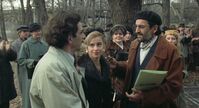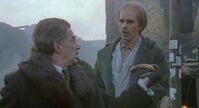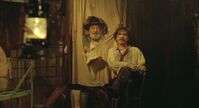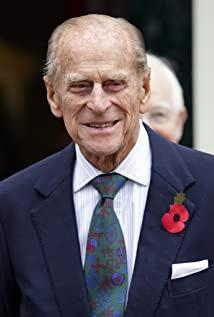Kusturica's national complex towards the defunct Yugoslavia is expressed through the process of inner transformation of characters from 1941 to 1992 - by war - cold war - war.
At the beginning of the film, cheerful and humorous music erupted from the screen. The protagonists, the drunk Xiao Hei and Ma Gao, followed a group of people playing trumpets into the silent midnight street, announcing that they had joined the Communist Party. Characters come in the form of carnivals, or the allure of politics to fanatics is precisely because it's just a carnival and all that's done is a farce.
Margao: A typical hedonist and individualist. Even if he joined the Communist Party, he still shouted "I am a free man!".
During World War II, the Germans bombed the city, the danger was imminent, and he was eager to have sex with prostitutes - the opening shows the character. He has always been loyal to himself: betrayed his friends - during Xiao Hei's absence, he seduced Xiao Hei's lover Natalia; greedy for life and fear of death - Xiao Hei was detained by the Gestapo and escaped by himself.
During the Cold War, for the sake of his own reputation, he claimed to the official that the national hero Xiao Hei had died, and from time to time played air defense sirens to continue to deceive the underground people. World War II was still going on. The official filmed a biographical film about his deeds. He met his special actor and asked, "Are you me?" It was undoubtedly a spiritual self-torture. But that didn't change him to continue his bad behavior. Knowing that his power was lost, he even blew up everyone underground.
During the war of Yugoslavia's disintegration, he transformed himself into a warmonger again. He was subsequently ordered to be executed by his friend Xiao Hei indirectly. Along with Natalia, the burning corpse spins around the cross in his own wheelchair, seemingly begging for forgiveness. Xiao Hei: Absolutely loyal Communist Party member, fanatical defender. Always stick to "My City". Because of worship, he obeyed the orders of Tito, who was falsely preached by Margao, and was willing to hibernate in the ground. It was not until the son's wedding that the father and son saw the light of day again.
He is obsessed with war. Seeing the "enemy plane" fly over and chase after his son who can't swim, he drowns. When he dived to find his son, he was restrained by a fishing net. That fishing net is lingering idolatry.
Yugoslavia disintegrated in 1992, and as a commander, he re-entered the war. When the soldiers of the United Nations peacekeeping force asked him about his affiliation, he finally woke up and no longer believed in any faction, only loyal to himself and his motherland. -Unfortunately, the motherland no longer exists.
Xiao Hei's heyday only missed the peaceful era.
Natalia: The career setting - acting - hints at her future choices. She has always played for power: during World War II, she played for the Gestapo; during the Cold War, she played for political figure Ma Gao; once Xiao Hei took power, she returned to him. Especially at Jovan's wedding, her dancing with the gun barrel of a tank erotically confirms the character's purpose: the gun barrel symbolizes the powerful men, and she is around them to flatter.
Xiao Hei rescued her from the power man twice - tied behind her back, but she struggled to shout "I am a free woman!" The effect of irony is undoubtedly revealed. Ivan: Historical designator. In order to find Sony the orangutan, he went out of the ground and became the only survivor and a witness to history. But he stuttered and stopped talking when he was drunk. When he returned home, he was told that "there is no Yugoslavia", the homeland of his relatives no longer exists, and he is as lonely and helpless as the rotten Keshan people. The appearance of the lost orangutan, which is like a historical evidence, is silent because it is an animal. Ivan symbolizes a potential semi-aphasia state of historical designator, implying that Yugoslav history is barely able to speak for itself.
Jovan: Victims of war. He has been underground since he was born. At the age of 20, marriage heralds growth, and finally he and his father, Xiao Hei, can walk to the ground. At that moment, it is still a dark night that is no different from the underground. He mistakenly identified the moon as the sun. Father corrects him, "The sun is asleep". Underwater, with the figure of swimming fish, Jovan was nervous to be regarded as a torpedo - thanks to the education in the underground, everything was still kept in wartime education, and the first task was to identify dangerous threats.
At sunrise, Jovan's eyes were not used to the dazzling brightness, and he wanted to return to the ground.
If Jovan represents the new generation of Yugoslavia, his fear and oversensitivity to war are the portrayal of the new generation of Yugoslavs. Father Xiao Hei kept asking "Is there any trace of Jofan?" but no one answered, implying that the national culture has no successor.
The sun generally symbolizes great leaders, especially in times of war. From Xiao Hei's words, the film expresses the change of concept of characters with the enrichment of life experience: from the beginning of being persistently loyal to idols - all the underground people sing "Tito's Song" in unison, to "the sun is asleep" , until "there is no more sun", a step by step heralding the disillusionment process of idolatry. Ironically, the orangutan (non-human) entered the tank and opened fire, shaking the underground order, making it crumbling, people fell into chaos, and father and son had a chance to get out of the underground. People are obsessed with the fantasy of idols, and they are almost unwilling to wake up if they cannot be destroyed by external forces.
And what is the essence of what people worship? Relying on what? What to rely on? Their thoughts are repetitive and have no backbone. For example, in Natalia's play, the actors tilted left and right exaggeratedly and greatly, and the audience under the stage followed with their heads left and right; in the underground education process, the children's bodies were tilted left and right. They themselves haven't figured it out yet.
The surreal ending comforted the audience's psychology: Xiao Hei came to the underground ruins, and during the hallucination, he saw the face of his son Jovan emerging from the well, and threw himself into it. All those who have lived underground pass through the bottom of the water, reach the other shore, and gain new life (human birth?). In a utopian paradise, the band is still playing cheerful themes, people stay in their most cherished years, sinners are forgiven, the mentally handicapped Beto is back to normal and can walk freely without a wheelchair, and the stuttering Ivan can finally fluently state the conclusion. . There is no war, only beautiful weddings. When dealing with history and sinners, as Xiao Hei said, "you can forgive but not forget". At this time, the land they were on was separating from the parent body and drifting away. Yugoslavia eventually disintegrated.
Written at 2010-11-02 17:55
Rescue mtime blog draft box stuff
View more about Underground reviews










